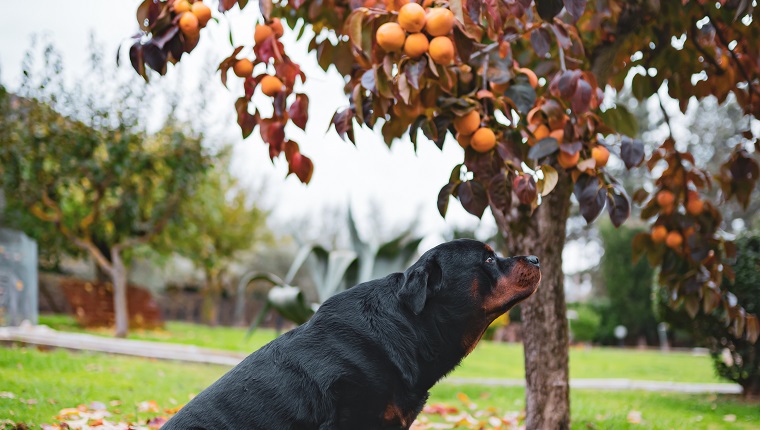Can dogs eat persimmon fruit? Maybe you have a persimmon tree and let your dog peruse the fallen fruits, wondering if they’re safe. So, let’s answer that question. Is persimmon fruit safe for dogs?
The short answer is yes, persimmon fruit is safe for dogs with controlled access to the fruit. This means it must be served by you with proper preparation, and not eaten off the ground. While there are no reported toxic properties, this fruit does come with digestion concerns.
As always, seek stead-fast answers that you can trust from your veterinarian before adding any new foods to your dog’s diet. Here is what you should know about how persimmon fruit can be nutritious and safe for dogs.
How Is Persimmon Fruit Good for Dogs?
Persimmon fruit is an odd little creation. It looks like an orange tomato, tastes like honey, and is technically a berry — though, very large as far as berries typically go.
Nutrient benefits include vitamins C and A, which aid in immune system health and the long-term integrity of sight. Both are highly important things to boost for dogs, of course.
However, it is important to note that dogs do produce vitamin C naturally, so persimmon fruit isn’t packing the same kind of health punch as other exotic fruits. Both papaya and dragon fruit are fellow exotic fruits with a far denser nutrient load.
But, persimmon fruit does have that delicious, honey-like flavor that dogs love. Plus, they have satisfyingly juicy flesh that dogs often find irresistible with treats. That, though, can be an issue.
How Can I Safely Give Persimmon Fruit to My Dog?

If you have a persimmon tree in the backyard, you’ll want to be mindful of your dog’s curiosity about the fruit. Dogs love sweet fruits and will go after them, but persimmon fruit shouldn’t be offered or consumed whole. Preparation is needed.
This preparation, however, isn’t terribly difficult. It’s really the pit, or core, of the fruit and its seeds that cause issues. There aren’t necessarily toxic properties to either, but both can cause significant intestinal obstruction. Plus, both are choking hazards.
With this in mind, allowing dogs to eat up fallen persimmon fruits is a bad idea. As we all know, dogs don’t really distinguish between the good parts of food and the bad.
If you suspect that your dog may have eaten a whole persimmon, or several, keep an eye out for signs of intestinal blockage. These signs include:
- Strained Bowel Movements
- Diarrhea
- Excessive Drooling
- Abdominal Pain & Bloating
- Lack of Appetite
- Lethargy
- Vomiting
This, of course, doesn’t mean that they can’t enjoy persimmon fruit! It will just take a little bit of work on your part. Luckily, it’s no more than you would put in to consume it, yourself.
Slice open the fruit, core out the center along with the seeds, and then chop the flesh of the persimmon up into chunks.
Does your dog enjoy persimmon fruit? How have you served it to your dog? Let us know in the comments below.









